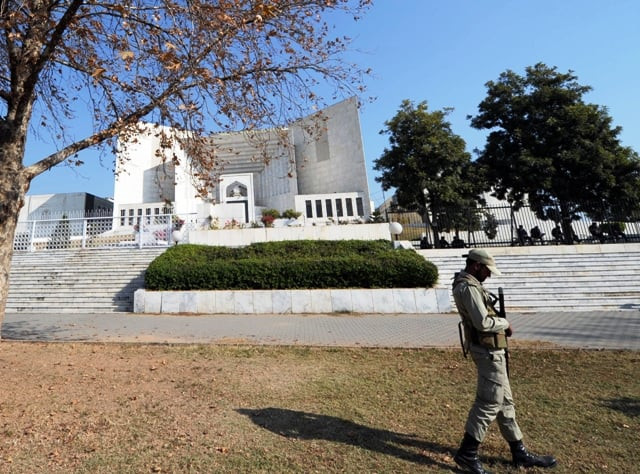Appeal against contempt indictment: SC, Aitzaz hold ground in six-hour marathon
Court calls language of appeal ‘contemptuous’, tells PM’s lawyer to close arguments by 10.30 am today.

With Aitzaz Ahsan and Chief Justice Iftikhar Chaudhry facing each other in court for the first time since the movement to restore the judiciary, the hearing had started with an exchange of pleasantries and in a friendly tone.
This did not last long. Most of the next six gruelling hours in court were charged, with rancour in the air.
The eight-member bench hearing Prime Minister Yousaf Raza Gilani’s intra-court appeal against his indictment in a contempt case adjourned the hearing till Friday (tomorrow) and ordered the premier’s lawyer, Aitzaz Ahsan, to conclude his arguments by 10:30am.
During Thursday’s hearing, Chief Justice Iftikhar Muhammad Chaudhry, heading the bench, remarked that the appeal itself was in contempt of the court – and, once again, no side budged on the central issue of writing a letter to the Swiss authorities.
“The prime minister should write the letter – we will pass the order,” the chief justice told the court in reference to the court dropping its summons order for Gilani to face indictment for contempt on Monday.
Justice Saqib Nisar directed Aitzaz to remove “objectionable” paragraphs from his appeal, while Justice Chaudhry asked the barrister how he could include paragraphs in his appeal which say that the contempt case cannot be initiated against a prime minister who helped restore the judges. “It is an effort to influence the Supreme Court hearing and its judges,” the chief justice said.
Aitzaz, in reply, said that even if a contempt case was initiated against him, keeping in view his struggles for the restoration of the judiciary, he would have taken the same stance.
However, three objectionable points from the intra-court appeal were removed on the court’s insistence. Aitzaz maintained that the court should dispose of the contempt notice, saying that the case is not one of contempt, irrespective if the prime minister is right or wrong.
The bench remarked that, instead of asking to dispose of the notice, the prime minister should be asked to tender a statement of repentance and assure the court that he will comply with its orders.
Aitzaz said that it is not the duty of the Supreme Court to enforce the orders; rather, this falls under the high court’s responsibility. To this, the bench said that the high court can proceed with the case, but even then there would be no way out – in other words, the letter must be written.
For Justice Saqib Nisar, the contempt issue cannot be separated from implementation of the NRO judgment. The eight-judge bench appeared intransigent that the government must respond to its request, made in December 2009, that corruption cases be re-opened.
The chief justice insisted once again that the prime minister should have taken the initiative in re-opening the cases. He emphasised that the court had shown patience in the two years and three months since its order.
The court also made reference to President Asif Zardari’s recent TV interview in which he said that it was a party decision not to write a letter to the Swiss. The court expressed its dissatisfaction with following a party’s decision over the courts.
Aitzaz was then asked not to compare his case with the Provisional Constitution Order judges’ case.
“I will tell you from the facts and record that the PM did not commit any contempt,” Aitzaz said. The court observed that for this purpose trial proceedings are required after the framing of contempt of court charges against the PM. “I have no objection then,” Aitzaz told the court.
The chief justice expressed regret but also took a firm stance. “We don’t want to initiate trial proceedings against the PM but we only want compliance of our order,” he said. Justice Jawwad S Khawaja said the court wanted to know where the nation’s ‘looted money’ had gone. Aitzaz pointed out that the Swiss authorities had themselves closed the cases in 2008, when Zardari took office, on merit, and that there was no third party to claim the funds. The court contradicted this and asked Aitzaz that, if this was the case, why was the government so reluctant to write a letter?
When Aitzaz discussed international law which backed the notion of presidential immunity, the court offered him the option of arguing on the immunity issue, but he retreated, saying that he was only contesting the PM’s case.
There was some lightness, however, with Justice Chaudhry quoting a verse from Mirza Ghalib’s poetry to ask Aitzaz not to confuse the issues.
Published in The Express Tribune, February 10th, 2012.



















COMMENTS
Comments are moderated and generally will be posted if they are on-topic and not abusive.
For more information, please see our Comments FAQ